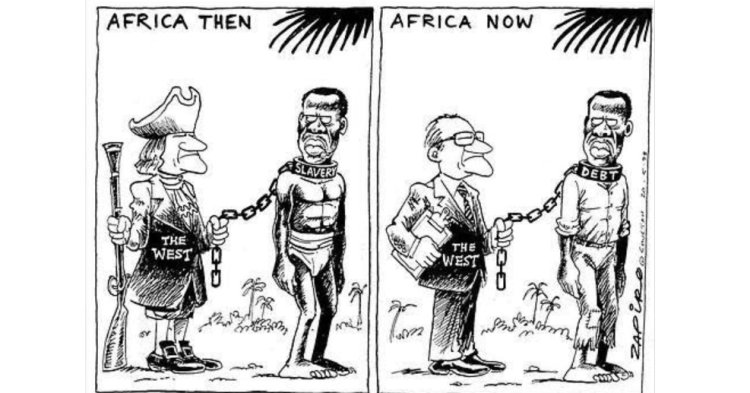The 19th and 20th centuries represented turning points in history around the world. The two centuries saw the acceleration of the industrial and technological revolutions, the emergence and consolidation of several nation states and a revolution in warfare, amongst others. These were all major events and occurrences which largely shaped the contemporary world we live in today. However, a crucial phenomenon that also transpired during this period is seemingly not given as much importance as other major events such as world wars and nation building. Nonetheless, the subject has been growing in the public debate in the past few decades. The great European powers’ colonialism and imperialistic ambitions have induced over-reaching implications throughout history, extending to contemporary times. Oftentimes colonialism is viewed as a distant phenomenon that does not affect us today. However, arguably, the opposite is true. The over-reaching effects of colonialism include some of the most-deadly conflicts of recent history and modern times as well as having exacerbated some of the global inequalities that are still present today. An interesting contradiction emerged in European ideology and practise during the 19th and 20th centuries: the dichotomy between rampant nationalism and stark colonial and imperialistic tendencies among the European great powers. It is interesting to see how nationalism and colonialism were politicised and used as tools by two of the greatest colonial powers of the time, France and Britain who were essentially pursuing aims of monetisation and power consolidation.
The Age of Rampant Nationalism
Early nationalism began to emerge as early as the 17th century in England. However, from the 18th century onwards, nationalism was growing more popular across Europe. In fact, it began to spread like wildfire and consolidate itself in art, literature, politics, and warfare. Essentially, in the 19th and 20th centuries, nationalism was the word of the day. It was romanticised and ideas of nationhood and advocacy of political independence became major trends in Europe. The concept found its roots in the fact that states should be organised upon ethnic and national lines: Italy belonging to the Italians, Poland belonging to the Poles and Germany belonging to the Germans. During this period uplifted self-determination, devotion, and loyalty to one’s nation and above all else, a large sense of national consciousness would grow. The construction of nation states led to the defence and pride against other nation states, and thus, nation states would become the major actors of the international system. Despite all this, in many instances, the nationalism rhetoric has only been used in situations where it suited the European powers and more specifically the victors of the two world wars. While nationalism and self-determination were encouraged on paper, in practise one can identify a much more contradictory situation. It becomes increasingly visible upon the analysis that the 19th and 20th centuries nationalism as a practise was not universally applied. It seems that the European powers only saw as far as their own gains in the adoption of nationalistic sentiments. While it was fashionable to agree that France should belong to the French and Britain to the British, it was unthinkable that Egypt should belong to the Egyptians, or Palestine to the Palestinians. In fact, this phenomenon is also intertwined to the felt superiority of the white race and European civilization upon others.
A Time for Freedom?
An interesting development occurred following the end of WWI. The climate of 1918-9 was that the time had come for freedom. There was a notion that imperialism was a thing of the past. This is visible through American President Woodrow Wilson’s rhetoric of liberalism and democracy. Despite all this, the idea of self-determination was one that only applied to the likings of the victorious powers of WWI, therefore at the expense of the Turks and the Russians. While the Balkans were gaining independence based on the popular ideologies of nationalism and self-determination, the French and British were carving up the Ottoman Empire for their own rule in the Sykes-Picot agreement. During the 1920s and 30s and to some extent also during WWII, there was a nationalist revival in various parts of the British and French Empires. Internationally, there was an even bigger sense that the old Empires and imperialistic systems were an outdated form of oppression. Therefore, in a show of nationalist spirit, the Middle East was divided into four mandates between the French and British to ‘prepare for independence’. However, this independence was largely a sham and the main aim of the British and French still remained monetisation. Rather than truly preparing the region for independence, the French and British would extract as many resources and churn as much capital from their mandates in this region as possible. Various Arab kings were appointed by the British to keep the promise to the Arabs but essentially these were puppet-kings used to pursue a pro-British policy such as King Abdullah in Trans Jordan. In fact, the Hashemite dynasty still continues to rule in Jordan today, making it one of the most consistently pro-Western Middle Eastern states. Once the British and French extracted as much capital from their colonies as possible, they dropped them, giving little attention to conflicts that may ensue amongst the local populations of the colonies. Therefore, they only granted independence when the colonies were no longer profitable for them or if they became too problematic like in the case of Palestine. Alternatively, former colonial powers found other ways to maintain peace while continuing to take advantage of the countries legally, such as through the Commonwealth. Therefore, decolonization was not done in a great spirit of nationalism as is popularly portrayed in Western media. In fact, colonialism itself is a major cause for global inequalities. This is clearly visible since the less economically developed states are most often former colonies whose resources were extracted by European powers and then abandoned once they were no longer economically productive or viable.
Detrimental Effects of Colonialism
Besides exacerbating global inequalities and poverty, colonialism also created some of the deadliest conflicts in modern times. A prime example of this is the India-Pakistan conflict which largely occurred due to the messy decolonization of Britain’s ‘crown-jewel’: India. Even prior to the partition, the divide and rule strategy in India created several divisions amongst the population mostly on religious lines that would lead to communal violence and tensions. Lord Mountbatten, the last viceroy of India sped up the exit of Britain from India due to personal career interests. Besides this, a swift retreat from India was favourable to try and make it seem like Britain’s rule of India was functional and that things only fell apart once Britain left. In reality, the situation was already deteriorating in India years before the British left. An arbitrary line was drawn on the map dividing India and Pakistan in 1947, leaving 15 million people displaced as conflict ensued. Arguably the conflict would have occurred even if Britain did not leave so hastily due to the nature of the disputed claims. However, the divide and rule tactics used by Britain certainly increased divisions between Muslim and Hindus of the country. This occurred because the division did not only imply drawing a line between two regions but it also meant the displacement of thousands of Muslims in India with the aim to reinstall them in Pakistan in order to create one Muslim state and one Hindu state. Consequently, this led to people fighting for their lands at the borders. Indeed, the partition was arguably well-planned, but poorly thought through and executed. It mainly resulted from politicians thinking that relocating thousands of people from one place to another would not have any negative effect on the population. This was a very poor analysis of the situation since it would have obviously led to property rights issues and economic difficulties, for the least. Better attention from the British could have prevented the conflict from being so deadly and devastating. Similar to this, antagonistic relations between Israel and Palestine and the wider Arab-Israeli conflict also emerged due to British colonialism in the region. Through the Balfour Declaration, Britain gave a free pass for Jews to settle in Palestine mostly with political imperialistic aims. In a typical colonial move the indigenous people of Palestine were not consulted in this decision that would have huge effects on their community. Although other elements come into play, the seeds of this long-lasting conflict were sowed in the period of British colonial involvement in the region.
Concluding Remarks and Hope for the Future
The relevance of all of this today is of utmost importance. Europe must officially acknowledge the deep and longlasting detrimental effects of the colonial and imperial missions in various regions of Africa, the Middle East and Asia. It is critical that the EU works together to try to diminish these effects through enhanced diplomatic relations, stronger economic ties and through aid to the countries still struggling today from Europe’s colonial endeavours. In 2017, Britain celebrated 100 years from the Balfour Declaration, the same event that sparked off the ongoing Israeli-Palestinian conflict. This celebration of a colonial endeavour which created endemic insecurity and a deadly conflict is exactly the kind of behaviour that needs to stop. It embodies a latent disregard and denial of the European powers’ imperialistic faults. The time has come to change the perception amongst Europeans. Rather than viewing imperialism and colonialism with pride and grandeur, it is important for states to acknowledge the grave mistakes made and work towards better relations with post-colonial countries. On a positive note this is already starting to occur with some countries that have starting to acknowledge their mistakes like France relating to the genocide of Rwanda. Nonetheless, a lot of work still needs to be done and the first step towards has to be the European recognition of its mistakes made throughout the history of colonialism.
Sources
De Juan, A., & Pierskalla, J. H. (2017). The Comparative Politics of Colonialism and Its Legacies: An Introduction. Politics & Society, 45(2), 159–172. https://doi.org/10.1177/0032329217704434 Ganguly, S., Smetana, M., Abdullah, S. et al. (2019). India, Pakistan, and the Kashmir dispute: unpacking the dynamics of a South Asian frozen conflict. Asia Europe Journal. 17, 129–143. https://doi-org.ejournals.um.edu.mt/10.1007/s10308-018-0526-5 Verghese, A., & Teitelbaum, E. (2019). Conquest and Conflict: The Colonial Roots of Maoist Violence in India. Politics & Society, 47(1), 55–86. https://doi.org/10.1177/0032329218823120 Ojo, E. O. (2016). Underdevelopment in Africa: Theories and facts. The Journal of Social, Political, and Economic Studies, 41(1), 89-103. Retrieved from https://www-proquest-com.ejournals.um.edu.mt/scholarly-journals/underdevelopment-africa-theories-facts/docview/1783935512/se-2?accountid=27934 Thorpe, B. J. (2018). Eurafrica: A pan-European vehicle for central European colonialism (1923–1939). European Review, 26(3), 503-513. http://dx.doi.org.ejournals.um.edu.mt/10.1017/S1062798718000200 Mathew, M. W., (2013) The Balfour Declaration and the Palestine mandate, 1917–1923: British imperialist imperatives. British Journal of Middle Eastern Studies, 40(3), 231-250. doi: 10.1080/13530194.2013.791133 Long, C. W. R. (2017). The Palestinians and British perfidy. Portland: Sussex Academic Press.


Follow the comments: |
|
